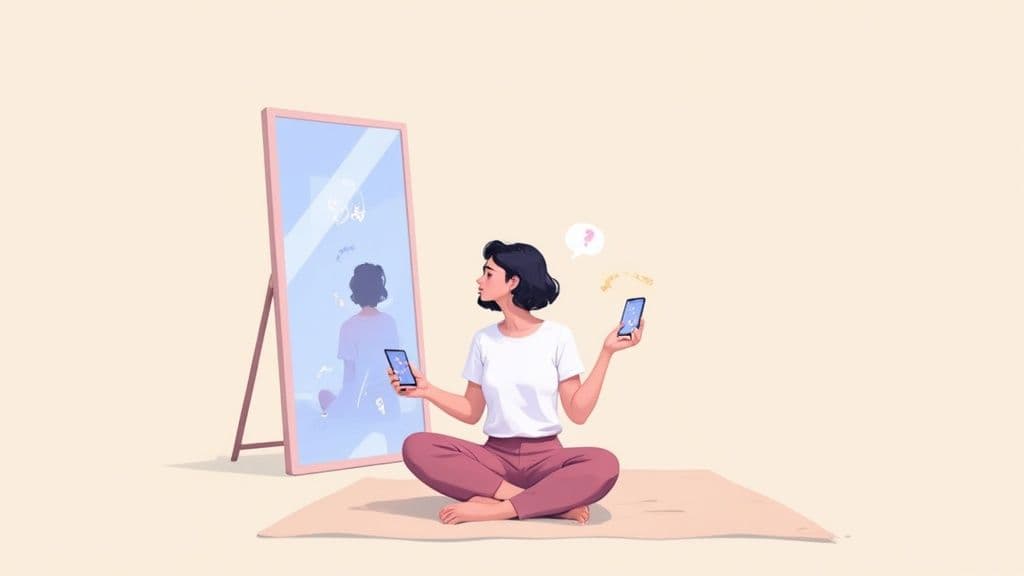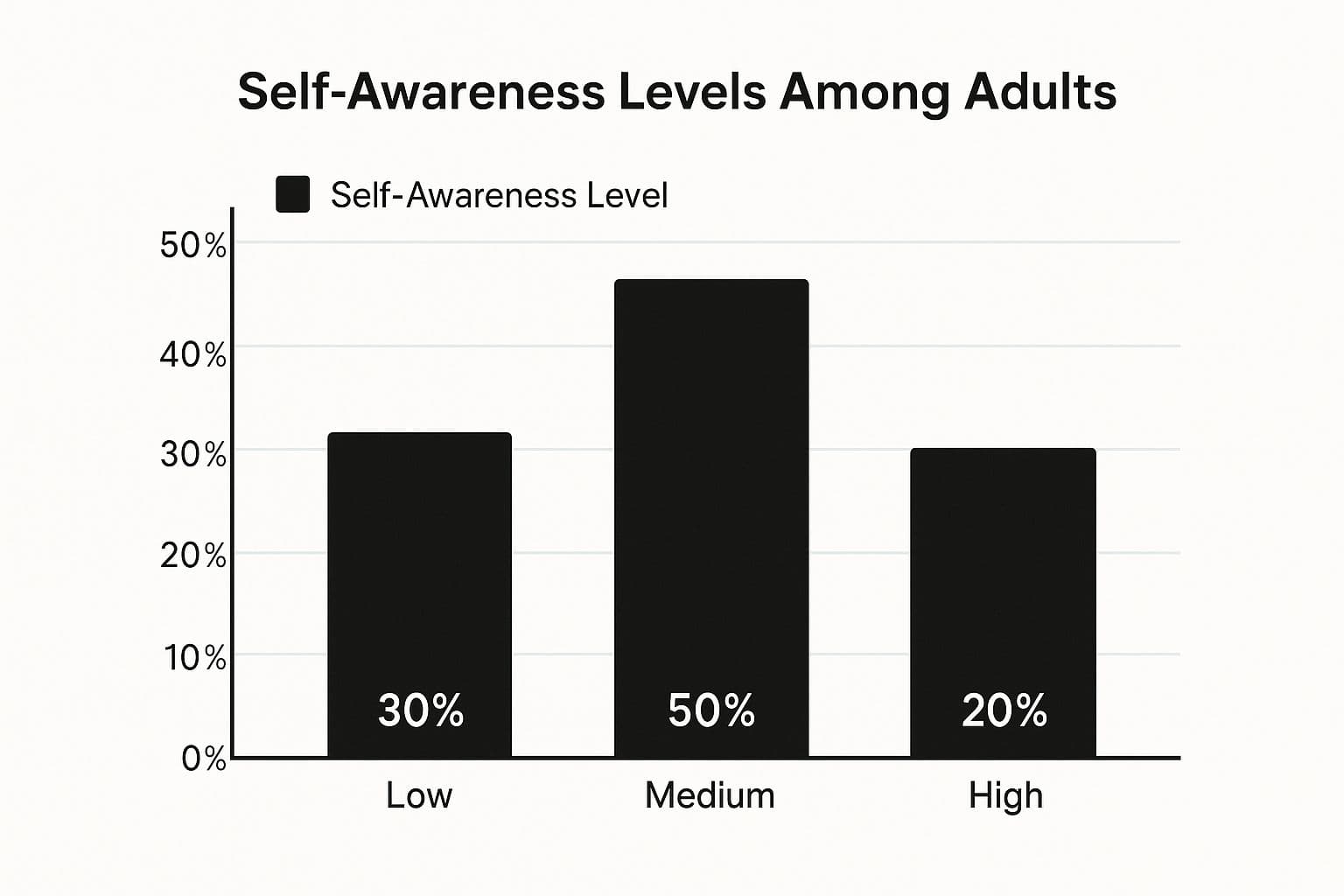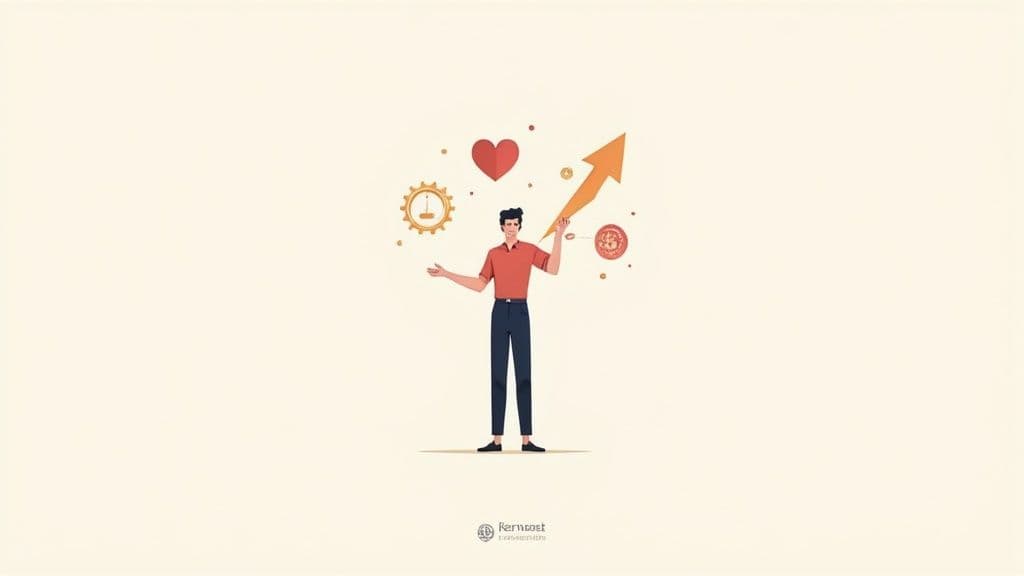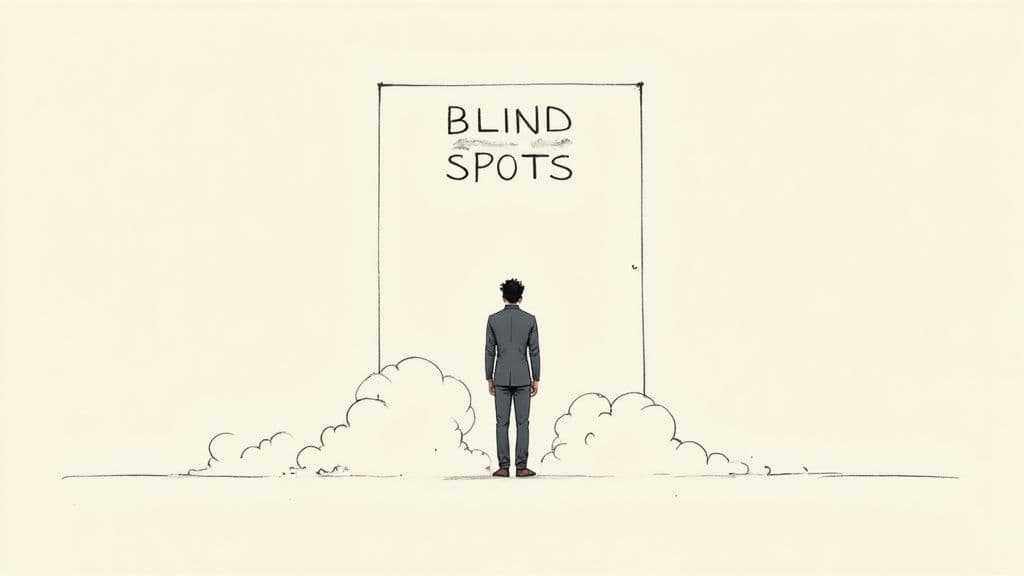Developing self-awareness requires practice. This concise guide offers daily exercises, clear feedback techniques, and simple reflection tools to help you notice patterns, manage emotions, and close the gap between intent and impact.
August 3, 2025 (6mo ago) — last updated November 26, 2025 (3mo ago)
Practical Self-Awareness Guide: Steps & Exercises
Daily exercises and feedback strategies to build lasting self-awareness, emotional intelligence, and resilience.
← Back to blog
Practical Self-Awareness Guide: Steps & Exercises
Summary: Practical steps to build lasting self-awareness, improve emotional intelligence, and grow resilience with daily exercises, feedback, and reflection.
Introduction
Developing real self-awareness takes practice, not just information. This guide gives clear, practical exercises and feedback strategies you can use daily to understand your thoughts, emotions, and impact—and to turn that insight into greater confidence and resilience. Use the short practices here, connect them to longer routines like journaling or mindfulness, and repeat them until they become habits.

Why Most Self-Awareness Advice Falls Short
We’re flooded with personal development tips, yet many people still miss the gap between knowing and doing. A common mismatch exists between how people see themselves and how they actually behave; research suggests many overestimate their self-awareness1. At the same time, the personal development market has grown rapidly, reflecting strong demand for practical tools that actually work2.
This isn’t about blame. Our minds protect our self-image, which makes objective self-observation challenging. Genuine self-awareness requires courage to look inward and a commitment to apply what you learn.
The Self-Awareness Perception Gap
Self-awareness isn’t about having every answer or being perfect. It’s about honestly examining your inner life and noticing how your actions affect others. Many quick “hacks” touch the surface but don’t teach you how to sit with hard emotions and learn from them.
| Common Perception | True Self-Awareness |
|---|---|
| Knowing likes and dislikes | Understanding why those preferences exist |
| Believing you’re a “good person” | Seeking honest feedback, even when it hurts |
| Having all the answers | Acknowledging uncertainty and staying curious |
| Avoiding negative feelings | Accepting and exploring emotions to learn from them |
| Justifying your reactions | Taking responsibility for your impact |
True self-awareness is an ongoing practice of inquiry, not a fixed state.
From Information to Practical Action
Reading about self-awareness is not the same as practicing it. Think of it like reading a manual on swimming versus getting in the water. The shift from passive consumption to active application is where change happens.
“Real work begins when you move from consuming information to questioning your patterns and reactions in the moment.”
Apply what you read. Frameworks and apps can offer insights, but their value depends on how you use those insights in daily life. Learn, practice, and iterate.
Building Internal Self-Awareness
Start by mapping your inner world—values, automatic thought patterns, recurring emotions. Treat this as data collection with curiosity and compassion.
Daily Values Check-In
Your values guide decisions and meaning. A five-minute nightly check-in helps you notice when you lived by your values and when you didn’t.
Ask yourself:
- What decision today felt aligned or proud?
- When did I feel drained or off, and why?
- Which core value did I express today (for example, honesty or creativity)?
Spotting patterns—like feeling drained after meetings where you bite your tongue—helps you take concrete steps to align actions with values.
Thought Pattern Journal
A short thought journal helps you observe mental habits without judgment. When you feel a strong emotion, jot down:
- The trigger (what happened)
- The automatic thought (your first mental reaction)
- The emotion it produced
This builds distance between events and interpretations, a key step toward calmer responses and clearer thinking.
Build Emotional Vocabulary
Many people describe feelings in broad terms like “good” or “bad.” Emotional granularity—naming feelings precisely—lets you understand their message and respond better. Tools like an emotion wheel and Mindfulness-Based Stress Reduction practices can help you develop this skill3.
External Self-Awareness: See Your Impact
Understanding how others perceive you is essential. It’s not about people-pleasing; it’s about closing the gap between your intent and your actual impact.
How to Ask for Feedback Without Defensiveness
Find one or two loving critics—people who care enough to tell you the truth. Ask specific, behavior-focused questions, such as:
- “In that meeting, what was one thing I did that worked well?”
- “Thinking of our tough conversation, what could I have done to make you feel more heard?”
- “What’s one habit of mine that sometimes gets in my way?”
Specific questions invite specific answers and make feedback actionable.
Start, Stop, Continue
Use this simple model when asking for feedback:
- Start: What should I start doing to be more effective?
- Stop: What should I stop doing that’s counterproductive?
- Continue: What should I keep doing because it works?
This balanced framework highlights strengths, blind spots, and next steps.
Become a Social Observer
You can learn a lot without direct feedback by watching others’ nonverbal cues:
- Body language: Are people leaning in or away?
- Vocal tone: Does energy rise or fall after you speak?
- Group dynamics: Who supports ideas and who goes quiet?
These signals are data. Use them to adjust in real time rather than as reasons to be self-critical.

Turn Awareness into Resilience and Self-Esteem
Self-awareness becomes powerful when you use it to respond differently to life’s challenges. Noticing an emotion gives you a moment to choose your response rather than react automatically.
Pause and Plan
When a trigger hits, try this: pause, take a breath, and plan a better response. Even a single deep breath can reset your nervous system and create space for a constructive choice.
For example, when criticized in a meeting, pause and say, “Thanks for the feedback; I’ll review that.” Revisit the issue later when you’re calmer.
Evidence of Capability Log
Durable self-esteem comes from competence and self-compassion. Keep a short daily log of one thing you handled well or a skill you used. Over time, this becomes a factual record of your abilities and a reliable counter to self-doubt.
Research links improvements in emotional regulation and self-esteem with greater resilience4.
Why Self-Awareness Is a Global Power Skill
Self-awareness is no longer a niche “soft skill.” It’s increasingly essential for leadership, teamwork, and innovation. Employers and organizations prize people who understand their motivations, manage emotions, and close the gap between intent and impact.
The personal development market’s growth reflects this global shift, with strong expansion in regions like Asia-Pacific where demand for upskilling and mental wellness is rising25.
From Personal Insight to Professional Advantage
Self-aware people make better leaders, collaborators, and problem-solvers. They lead with empathy, seek honest feedback, and break free from cognitive biases. If you want to extend your self-awareness into a broader life purpose, connect daily practice to long-term vision through tools like a habit tracker, journaling system, or dedicated apps.

Common Questions (Q&A)
Q: Where should I start if I feel overwhelmed?
A: Begin with one tiny habit—five minutes of end-of-day journaling. Note one positive moment, one negative moment, and one decision. Small, consistent steps reveal patterns over time. See journaling prompts and templates for quick starts here.
Q: How do I know I’m reflecting and not ruminating?
A: Reflection leads to insight and action. Rumination keeps you stuck. If your thoughts loop, ask a forward-looking question like, “What’s one small thing I can learn from this?” Use time limits for reflection—set a 10-minute timer to keep it productive.
Q: How can I get feedback without panicking?
A: Ask two or three trusted people specific, behavior-focused questions. Use the Start/Stop/Continue model to keep feedback concrete and actionable. For guides on structuring feedback conversations, see our feedback model page here.
Discover Your Life Purpose Today!
Unlock your true potential and find your life’s purpose.
